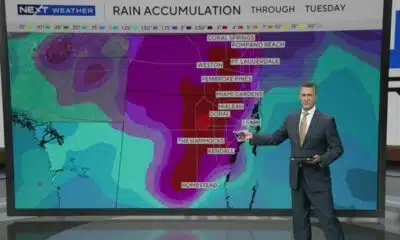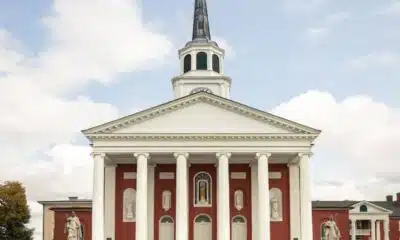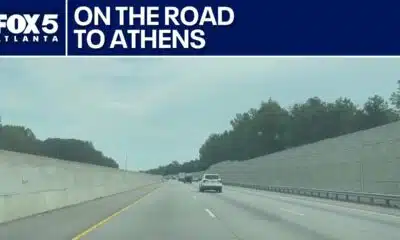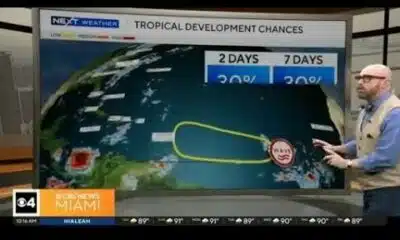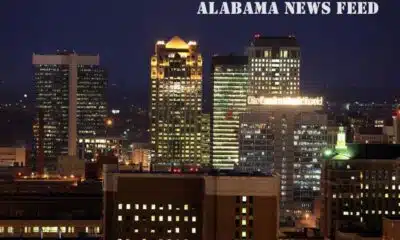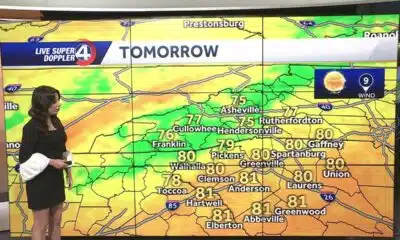News from the South - West Virginia News Feed
Trump’s DOJ wants states to turn over voter lists, election info
by Jonathan Shorman, West Virginia Watch
July 18, 2025
The U.S. Department of Justice is seeking the voter registration lists of several states — representing data on millions of Americans — and other election information ahead of the 2026 midterms, raising fears about how the Trump administration plans to use the information.
The DOJ is also demanding Colorado turn over all records related to the 2024 election, a massive trove of documents that could include ballots and even voting equipment. The Colorado inquiry, the most sweeping publicly known request, underscores the extent of the administration’s attention on state election activities.
At least nine states have received requests for information over the past three months, according to letters from the DOJ obtained by Stateline. Some states also received emails from a DOJ official last week asking for meetings to discuss information-sharing agreements.
The department’s focus on elections comes after President Donald Trump directed U.S. Attorney General Pam Bondi in March to seek information about suspected election crimes from state election officials and empowered her to potentially withhold grants and other funds from uncooperative states.
For years, Trump has advanced false claims about elections, including the idea that the 2020 election that he lost was stolen. Now back in power, his administration is taking a new level of interest in how states — and even local authorities — administer elections.
Last week, a political operative approached several Republican county clerks in Colorado to enlist them in election integrity efforts in light of Trump’s sweeping March executive order overhauling elections administration. One clerk told Stateline the operative claimed to represent the White House.
“Whatever the Trump administration tries to pull is very unlikely to be successful,” Colorado Secretary of State Jena Griswold, a Democrat, said in an interview, calling Colorado elections very secure. “With that said, do I think they are trying to undermine our elections at large in this country? Absolutely.”
DOJ has sent letters to Alaska, Arizona, Minnesota, Nevada, New Hampshire, New York, Pennsylvania and Wisconsin, in addition to the request to Colorado.
The letters have typically asked election officials to describe how they register voters and work to identify duplicate registrations and individuals not eligible to vote, such as people with felony convictions and those who have died. The Washington Post earlier Wednesday reported on the letters; Votebeat and NPR previously reported on some of the letters as well.
Most letters also ask about each state’s process for flagging noncitizen applicants. Noncitizen voting is against federal law and incredibly rare, but Trump and his allies have promoted false claims about its prevalence. The Trump administration is also conducting a general crackdown on illegal immigration.
The letters call on election officials to turn over voter registration lists, which in some instances contain data on millions of residents in their states. This request has raised the most concerns, with some experts saying it’s unclear exactly why the DOJ wants the information.
“They don’t make much sense as law enforcement investigations. That makes me think that there’s some other purpose,” said Justin Levitt, who served as senior policy adviser for democracy and voting rights in the Biden White House and is now a law professor at Loyola Marymount University.
While many states make their voter registration lists available to the public, Levitt emphasized the data could still be largely off-limits to the federal government. Federal privacy law sometimes restricts how the government can use data that’s publicly obtainable. The DOJ may need voter information in some individual circumstances, but “that’s not blanket permission to go vacuuming up data.”
The DOJ didn’t respond to questions for this story.
Federal laws restrict the federal government’s ability to centralize information on Americans, said David Becker, executive director of the nonpartisan Center for Election Innovation & Research. Even if states provide voter registration information to the public, they often redact sensitive information.
In Orange County, California, the DOJ sued local election officials in June, seeking unredacted voter registration information, such as Social Security numbers and driver’s licenses, as part of an investigation into noncitizen voting.
More than 350 election officials from some 33 states participated in a conference call about federal actions on Monday hosted by Becker, who was previously an attorney in the DOJ Voting Rights Section during the administrations of Presidents Bill Clinton and George W. Bush. He said the interest in the call shows the level of uncertainty and anxiety over the current “federal imposition” on election administrators.
“The DOJ seems dead set on acquiring personal information on voters, including driver’s license numbers, Social Security numbers and dates of birth — records that are highly protected under federal law and under state law and which state election officials are sworn to protect,” Becker said.
Sweeping Colorado requests
In Colorado, the amount of data the DOJ wants is enormous. On May 12, Harmeet Dhillon, an assistant U.S. attorney general in the DOJ’s Civil Rights Division, sent a letter to Griswold, the secretary of state, asking for access to “all records” related to the 2024 election.
Federal law requires state election officials to preserve records related to elections for 22 months. Typically, the rule ensures records are preserved in case any lawsuits are filed over an election. In the letter, Dhillon referred to a complaint against Griswold’s office alleging noncompliance with records retention laws, but provided no details.
The DOJ seems dead set on acquiring personal information on voters, including driver’s license numbers, Social Security numbers and dates of birth — records that are highly protected under federal law and under state law and which state election officials are sworn to protect.
– David Becker, executive director of the nonpartisan Center for Election Innovation & Research
Experts on election administration who spoke to Stateline expressed shock at the scope of the demand to Colorado. The request encompasses a vast trove of material, potentially including ballots.
“The amount of records being requested from a place like Colorado … it’s really, really significant in terms of the volume of materials that are required to be retained,” said Neal Ubriani, a former voting rights litigator at the DOJ during the Obama and first Trump administrations and the current policy and research director at the nonpartisan Institute for Responsive Government.
Colorado elections have previously drawn Trump’s attention. Former Mesa County Clerk Tina Peters, a staunch Trump supporter, is serving a nine-year prison sentence after a conviction in state court for allowing unauthorized access to voting equipment in 2021.
On May 5 of this year — a week before the Dhillon letter to Griswold — Trump posted on social media that Peters should be released, calling her a “political prisoner.” Griswold noted the timing.
“I think the bigger picture is Donald Trump is continuing to try and rewrite the 2020 election and destabilize the ’26 and ’28 elections,” Griswold told Stateline.
The Colorado Secretary of State’s Office responded to the DOJ by providing copies of the state’s master voter file and voter history file. All of the information provided is also available to the public.
Some Colorado Republican county clerks in recent days have also been approached by Jeff Small, a political operative who worked at the U.S. Department of the Interior during the first Trump administration. Stateline and Colorado Newsline spoke to three GOP clerks who said they had spoken to Small last week.
Steve Schleiker, clerk of El Paso County, which includes Colorado Springs and is the most populous county in the state, said that on July 9 he received a text and call from Small, who introduced himself in a voicemail as someone who “works for the White House.”
Schleiker said that when he called back, Small said he wanted to build relationships with clerks because the Trump administration was unhappy with progress on the president’s elections executive order. He later connected Schleiker with a Homeland Security official who wanted to test the security of El Paso County’s election systems, said Schleiker, who added that he opposed the request.
Weld County Clerk Carly Koppes said she also heard from Small, but that Small told her he wasn’t under contract or being paid for the calls. Small indicated he was making the calls on behalf of former colleagues, Koppes said.
Small, a former Capitol Hill chief of staff who now works for a Colorado-based government affairs firm, didn’t return a call to his office on Wednesday. The U.S. Department of Homeland Security said in a statement that the agency works with local partners to ensure elections remain safe.
“We don’t disclose every single conversation we have with them,” an unidentified DHS spokesperson wrote in an email.
Matt Crane, executive director of the Colorado County Clerks Association, said he was aware of 10 clerks approached by Small. He noted that every clerk approached by Small hails from a county that uses Denver-based Dominion Voting Systems.
While Dominion is widely used in Colorado, it’s also been the subject of election conspiracy theories. A former candidate for county sheriff in southwest Colorado was arrested in June, accused of firebombing a clerk’s office. Colorado Public Radio reported the suspect, according to law enforcement, had spoken publicly about trying to get rid of the county’s Dominion machines.
“I think the really important thing to say here is that it was Republican clerks who stood up to a Republican administration and said, ‘No, we’re going to follow the law,’” Crane said.
The intent of the efforts by Small and the federal government “has been muddied up it seems,” Montrose County Clerk Tressa Guynes said. Based on her conversations with other clerks, she said, it appeared Small represented one thing to other clerks and then “represented maybe a watered-down version by the time it got to me.”
Guynes said Small wanted to discuss Trump’s elections executive order. She said Small asked whether she would be willing to support a federal task force’s efforts in an advisory role.
“I said absolutely I will advise,” Guynes said. “I said I’m frankly glad that they’re finally reaching out to the boots on the ground, the people who actually conduct the elections, instead of listening to those who have never conducted a Colorado election.”
Letters to other states
As Colorado grapples with the most far-reaching request, other states are choosing how to respond. In Wisconsin, the state election commission responded to a DOJ request for the voter registration list with instructions on how to request public voter data.
Arizona Secretary of State Adrian Fontes, a Democrat, responded on June 2 — after DOJ in a May 20 letter told the state to ensure voter registration applicants provided a driver’s license number, if they have one, instead of a partial Social Security number. The DOJ also wanted Arizona to check voters against a state database to look for noncitizens.
Fontes replied that Arizona complies with federal law and conducts checks using a state motor vehicle division database.
“We are focused on dealing with DOJ in a good faith manner while ensuring we are following the letter of federal and state laws,” Fontes spokesperson JP Martin wrote in an email to Stateline.
More recently, Arizona received a letter July 10 from DOJ about implementation of Trump’s elections executive order. Rhode Island Democratic Secretary of State Gregg Amore also received an email about the order the same day, according to a copy provided to the Rhode Island Current.
In the email, Scott Laragy, principal deputy director in the Executive Office for United States Attorneys, asks for a call to discuss a possible information-sharing agreement to provide DOJ with information on individuals who have registered to vote or have voted despite being ineligible, or those who have committed other forms of election fraud.
The email echoes the language in Trump’s elections executive order, which calls for DOJ to reach information-sharing agreements with states. While much of the order, which focused on proof of citizenship in elections, has been struck down in federal court, provisions related to information sharing remain.
The executive order directs Bondi, the U.S. attorney general, to prioritize enforcement of federal “election integrity laws” in uncooperative states. It also requires her to review grants and other DOJ funds that could be withheld from states that resist.
Some states have already struck deals with the Trump administration. Indiana Republican Secretary of State Diego Morales announced an agreement last week with U.S. Citizenship and Immigration Services allowing the state to access a database to verify the citizenship of registered voters. Alabama Republican Secretary of State Wes Allen has signed a similar agreement.
“With your cooperation, we plan to use this information to enforce Federal election laws and protect the integrity of Federal elections,” Laragy wrote to Rhode Island.
Janine Weisman of the Rhode Island Current and Lindsey Toomer of Colorado Newsline contributed to this report. Stateline reporter Jonathan Shorman can be reached at jshorman@stateline.org.
GET THE MORNING HEADLINES.
West Virginia Watch is part of States Newsroom, a nonprofit news network supported by grants and a coalition of donors as a 501c(3) public charity. West Virginia Watch maintains editorial independence. Contact Editor Leann Ray for questions: info@westvirginiawatch.com.
The post Trump’s DOJ wants states to turn over voter lists, election info appeared first on westvirginiawatch.com
Note: The following A.I. based commentary is not part of the original article, reproduced above, but is offered in the hopes that it will promote greater media literacy and critical thinking, by making any potential bias more visible to the reader –Staff Editor.
Political Bias Rating: Center-Left
The article reflects a Center-Left perspective, primarily through its language and framing. It emphasizes concerns from election officials and experts about the Trump administration’s motives behind broad voter data requests, highlighting skepticism and distrust toward federal overreach. The inclusion of Democratic voices like Colorado Secretary of State Jena Griswold, and references to “false claims” promoted by Trump, further frame the administration’s actions critically. While it quotes some Republicans and election officials from both parties, the overall tone leans toward cautioning against federal intrusion and voter intimidation, consistent with Center-Left journalistic norms.
News from the South - West Virginia News Feed
WV Supreme Court will hear BOE’s appeal in vaccine lawsuit — but not right away
by Lori Kersey, West Virginia Watch
September 5, 2025
West Virginia’s highest court will take on a legal battle over the state’s school vaccination requirements, but it denied a request by state school officials that it do so quickly.
The state Supreme Court on Thursday set a deadline of Dec. 12 for the West Virginia Board of Education to prepare its appeal of a Raleigh County judge’s July ruling against it. That ruling was in regards to a lawsuit brought by three Raleigh County families over the board’s refusal to accept religious exemptions to the state’s mandatory school vaccine requirements.
Raleigh County Circuit Judge Michael Froble in July granted a preliminary injunction in the case that allows students in the case to attend class with a religious exemption to the vaccination requirements.
The school board had filed notice of appeal and asked the high court to both expedite a review of the appeal and temporarily halt the proceedings in the lower court.
In the scheduling order Thursday, the court denied both motions. Justices also set a deadline of Jan. 26 for the plaintiffs in the case to respond to the board’s appeal. The board will then have until Feb. 16, 2026 to write a reply, if necessary.
After the Feb. 16 reply brief deadline, the court writes, the appeal will be ready for review.
The Raleigh lawsuit is one case in a legal battle over religious freedom and the state’s strict school vaccination requirements. Every state requires school students to be vaccinated against a number of infectious diseases including polio, chicken pox and measles. Florida officials announced this week plans to eliminate its vaccine mandates.
West Virginia has been one of only five states that have not allowed students to opt out of the shots because of their religious or philosophical objections to them.
West Virginia Gov. Patrick Morrisey issued an executive order on his second day in office requiring the state to allow religious exemptions. His order is based on the 2023 Equal Protection for Religion Act. He argues that the religious freedom law, when read alongside the vaccination law, calls for the religious exemptions.
Morrisey has not rescinded that executive order, even though the state Legislature earlier this year rejected a bill that would have established those religious exemptions in state code.
Raleigh County Circuit Judge Michael Froble has scheduled a two-day hearing next week on a permanent injunction in the lawsuit, which he recently consolidated with a lawsuit brought against the state health department by two parents of immunocompromised students over its issuance of religious exemptions. Plaintiffs in that case are represented by the ACLU of West Virginia and Mountain State Justice.
The hearing is set for Sept. 10 and 11 at the Raleigh County Judicial Center. During that hearing, the judge has said he wants to consider issues that include whether the state’s vaccination law is constitutional without religious exemptions and the authority of Morrisey’s executive order.
YOU MAKE OUR WORK POSSIBLE.
West Virginia Watch is part of States Newsroom, a nonprofit news network supported by grants and a coalition of donors as a 501c(3) public charity. West Virginia Watch maintains editorial independence. Contact Editor Leann Ray for questions: info@westvirginiawatch.com.
The post WV Supreme Court will hear BOE’s appeal in vaccine lawsuit — but not right away appeared first on westvirginiawatch.com
Note: The following A.I. based commentary is not part of the original article, reproduced above, but is offered in the hopes that it will promote greater media literacy and critical thinking, by making any potential bias more visible to the reader –Staff Editor.
Political Bias Rating: Centrist
The content presents a factual and balanced overview of the legal dispute surrounding vaccine exemptions in West Virginia without evident partisan language or framing. It reports on actions taken by government officials, court decisions, and ongoing lawsuits from multiple perspectives, including those of the state board, families, and advocacy groups. The neutral tone and focus on legal developments suggest a centrist approach, aiming to inform rather than persuade toward a particular political viewpoint.
News from the South - West Virginia News Feed
Christian’s Morning Forecast: Strong to Severe Storms Incoming
SUMMARY: Storm Watch meteorologist Christian Boler reports strong to severe storms approaching West Virginia, especially McDow, Tazewell, and Wyoming counties during the morning commute. Temperatures will remain in the upper 60s to low 70s with southwest winds around 5-10 mph. A marginal severe weather threat exists across the region, mainly involving winds and flooding, but no tornadoes or hail expected. Rainfall of a quarter to half an inch is likely over 48 hours with isolated downpours. Storms will arrive in two waves before clearing Friday. Another front may bring showers Saturday, but high pressure will clear skies for the weekend and beyond.
FOLLOW US ON FACEBOOK AND TWITTER:
https://facebook.com/WOAYNewsWatch
https://twitter.com/WOAYNewsWatch
News from the South - West Virginia News Feed
More states guarantee students the right to school-day religious instruction off campus
by Robbie Sequeira, West Virginia Watch
September 4, 2025
In the past month or so, federal courts have dealt a string of blows to conservatives’ push for the biblical Ten Commandments to be posted in public schools.
Yet as states lose over required religious displays, many are working on another route to faith-based education by allowing kids to attend off-campus religious instruction. This year, Iowa, Montana, Ohio and Texas passed laws guaranteeing parents the right to have their children excused during the school day for free, off-campus religious instruction, often called “released time.”
Those four states are the latest of at least 12 that require school districts to offer released time religious schooling upon parental request, including: Florida, Hawaii, Kentucky, New York, North Dakota, Pennsylvania, Vermont and Wisconsin.
The released time approach may be more likely to pass constitutional muster than other government-imposed religious efforts, experts say, by shifting influence off school grounds and under the direction of faith-based groups rather than public school teachers, and by making it free to students.
A 1952 U.S. Supreme Court decision in Zorach v. Clauson allows for released time religious instruction as long as it’s off school property, privately funded and parent permitted.
“Not every family has access to private or parochial school, but for many generations families have been able to take their students out of school for a portion of the day for religious education if they choose,” said Jennifer Jury, a program advocate for LifeWise Academy, an Ohio-based Christian nonprofit founded in 2018.
The organization has been active in expanding its reach and lobbying lawmakers for stronger legislative support. This school year, LifeWise expects to serve nearly 100,000 public school students across 1,100 schools in 34 states, Jury said.
The off-campus gatherings work the same way in most states: With parents’ approval, public school students sign out of school during a lunch, recess or study hall block. Students will either walk or ride one of the distinctive red LifeWise buses to a local church or a program-leased community building in town.
And depending on state limitations for the religious instruction, for either a half or full hour, kids will learn about the Bible. When the allotted time is up, students go back to their public school to finish the day.
In some states, students can earn academic credit for the off-campus instruction, which has been more controversial.
In Montana, for example, legislation that would have required school districts to develop policies for academic credit was amended to “authorize” a district to allow credit, after pushback from the state’s school boards and school administrators associations.
“School districts should have the autonomy to determine which external coursework aligns with the academic frameworks and whether such courses should be eligible for credit,” Rob Watson, who represented the two groups at the legislature, said in his comments to a House committee in February. He noted the groups did not oppose the released time policy itself.
Despite the changes, only one Democrat in the legislature voted “yes.” Montana GOP Gov. Greg Gianforte signed the bill into law in May.
Supporters had touted the academic credit option as a way to entice homeschooling families to consider public schools. In her interview with Stateline, Jury noted similar programs that accommodate Jewish, Muslim and Mormon faith-based teaching for public school students.
“Whether a person is religious or not, the Bible is widely recognized as one of the most influential books in history,” Jury said. “A lot of our Western culture was born out of ideas that come from the Bible, like the fact that every person is created equal, that we are to love our neighbor.”
Identical bill language
The conservative American Legislative Exchange Council, known as ALEC, in August adopted model legislation about released time policies that state lawmakers can propose.
Public schools would be required to allow dismissal for religious instruction under new bill
ALEC’s proposal would allow from one to five hours per week of off-campus religious instruction and would require school districts to award academic credit if the course meets certain criteria. Districts would have to assess instruction based on secular standards and would not be allowed to test for particular religious content, according to the model legislation.
Nearly identical language had already appeared in several state bills, including in North Carolina and West Virginia this year and in Mississippi in 2023. In North Carolina, LifeWise Academy registered with the secretary of state’s office in 2024, as reported by NC Newsline, and a released time bill was introduced in February. It was sent to committee but never moved ahead.
The bills in Mississippi and West Virginia also stalled.
Legislation that does become law earns praise from groups such as Alliance Defending Freedom, one of the nation’s most active legal organizations opposing abortion rights and same-sex marriage.
Statements from Greg Chafuen, senior counsel for the nonprofit’s Center for Public Policy, say the new released time laws respect “parents’ educational decisions” and ensure “parents are in the driver’s seat when it comes to their kids’ education.”
An Indiana law lets high school students leave school for religious instruction each week for an amount of time equal to one elective course. Ohio, Oklahoma, South Carolina and Tennessee laws allow students to earn elective credit for released time religious instruction, though it cannot replace a “core curriculum” class. School boards can set standards for when such programs qualify for credit.
LifeWise operates in each of those states.
Ten Commandment displays
Jury, of LifeWise Academy, said her organization wants off-campus religious options for public school students to be available in all 50 states.
“It’s important to note this is an option, and parents are the ultimate decision-makers in enrollment,” she said.
“We would love to see every student in the United States have the option to attend a program like LifeWise if they want to and if their parents want them to.”
A lack of parental choice might be what trips up state efforts to post the Ten Commandments in classrooms.
This is an option, and parents are the ultimate decision-makers in enrollment.
– Jennifer Jury, a program advocate for LifeWise Academy
After Louisiana last year became the first state in recent decades to require that the Ten Commandments, a central tenet of the Judeo-Christian tradition, be displayed in school classrooms, bills followed in at least 15 other states. Two states — Arkansas and Texas — enacted laws.
But for now, courts have blocked the mandates in all three states. In Texas, U.S. District Judge Fred Biery warned the displays “are likely to pressure [children] into religious observance” and undermine parents’ rights.
In Arkansas, U.S. District Judge Timothy Brooks called the state’s requirement to post a specific version of the Ten Commandments “plainly unconstitutional.”
The law “is not neutral with respect to religion,” he wrote. “By design, and on its face, the statute mandates the display of expressly religious scripture in every public-school classroom and library.”
He also noted that the law “requires that a specific version of that scripture be used, one that the uncontroverted evidence in this case shows is associated with Protestantism and is exclusionary of other faiths.”
Stateline reporter Robbie Sequeira can be reached at rsequeira@stateline.org.
This story was originally produced by Stateline, which is part of States Newsroom, a nonprofit news network which includes West Virginia Watch, and is supported by grants and a coalition of donors as a 501c(3) public charity.
West Virginia Watch is part of States Newsroom, a nonprofit news network supported by grants and a coalition of donors as a 501c(3) public charity. West Virginia Watch maintains editorial independence. Contact Editor Leann Ray for questions: info@westvirginiawatch.com.
The post More states guarantee students the right to school-day religious instruction off campus appeared first on westvirginiawatch.com
Note: The following A.I. based commentary is not part of the original article, reproduced above, but is offered in the hopes that it will promote greater media literacy and critical thinking, by making any potential bias more visible to the reader –Staff Editor.
Political Bias Rating: Center-Right
This content presents the growing trend of religious education programs in public school contexts with a generally favorable tone, highlighting legislative successes primarily in conservative-led states. The coverage includes references to conservative organizations such as ALEC and Alliance Defending Freedom, and discusses efforts to expand religious instruction in a way that aligns with conservative values emphasizing parental choice and the role of faith in education. However, it also acknowledges the legal challenges and concerns over constitutional boundaries, providing a balanced view that avoids outright advocacy or criticism. The framing and topics suggest a center-right perspective that supports religious accommodations within public education while respecting legal constraints.
-
Mississippi Today7 days ago
DEI, campus culture wars spark early battle between likely GOP rivals for governor in Mississippi
-
News from the South - Louisiana News Feed6 days ago
‘They broke us down’: New Orleans teachers, fired after Katrina, reflect on lives upended
-
News from the South - Missouri News Feed5 days ago
Missouri joins dozens of states in eliminating ‘luxury’ tax on diapers, period products
-
News from the South - Alabama News Feed7 days ago
Alabama state grocery tax to fall 1% on Monday
-
News from the South - Tennessee News Feed5 days ago
Tennessee ranks near the top for ICE arrests
-
News from the South - South Carolina News Feed7 days ago
Warm and Mainly Dry Labor Day
-
Mississippi Today5 days ago
Trump proposed getting rid of FEMA, but his review council seems focused on reforming the agency
-
News from the South - North Carolina News Feed6 days ago
NC Labor Day 2025: A state that’s best for business is also ranked worst for workers



